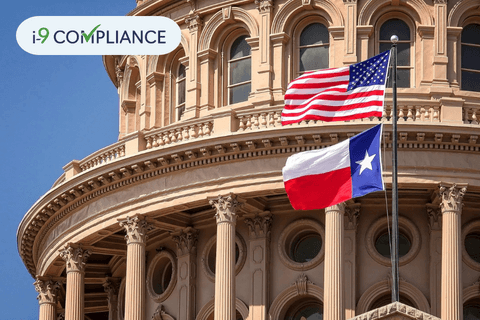Bill Filed in Texas Legislature to Strengthen E-Verify Requirements

January 23, 2023
A recently filed bill will strengthen the employment verification process in Texas. Through it, a Republican state representative hopes to pass stronger E-Verify legislation.
In the 2022 fiscal year, the state apprehended a record number of illegal foreign nationals. As a result, a state senator from North Dallas introduced House Bill 602 (HB 602). It will attempt to ensure that more employers correctly complete the employment eligibility verification process (Form I-9). In addition, this bill would require political subdivisions to participate in E-Verify.
E-Verify is an internet-based system run by the Department of Homeland Security (DHS) that allows employers to check their employees’ work eligibility. The bill defines “political subdivisions” as municipalities, junior colleges, counties, school districts, and other subdivisions or special districts of the state government. The bill would amend local government code to require subdivisions to register, participate in the E-Verify system, and terminate the employment of workers who refuse to comply.
Before HB 602, similar legislation known as HB 1336 attempted and failed to pass in the last session. In it, political subdivisions and contractors would have faced mandatory participation in the E-Verify system.
However, the Texas legislature passed SB 766 in the last session. This bill required sexually oriented businesses to participate in E-Verify. In addition, it will strengthen the state’s anti-sex trafficking efforts, as these businesses frequently involve sex trafficking.
In 2015, the state legislature passed a bill requiring state agencies and higher education institutions to use E-Verify for any new employees they hire. However, no states currently force private businesses to use the E-Verify system. Furthermore, companies in Texas and special interests have lobbied against strengthening the state’s employment verification laws.
Critics claim that these businesses and groups do not want firmer employment verification laws. According to the critics, this may be because they exploit migrants to profit from cheap labor. Furthermore, they theorize that the groups also participate in human trafficking and forced labor, regardless of intention.
People smuggled into the state to work for businesses often work for cartels. In such cases, the cartels keep their passports and control what the people do, their forced work, and where they live. They typically charge the individuals for food and rent before selling them to another group before they can pay off their debt. As a result, the individuals find themselves in debt again, and the cycle repeats.
Employers that hire migrants unauthorized to work in the United States often pay meager wages, if they pay at all. Sometimes, they threaten to report the workers to U.S. Immigration and Customs Enforcement (ICE). These employers also often hire such workers to avoid obeying labor laws they would otherwise follow if they employed U.S. citizens or lawful residents.
All employers must file Form I-9 for every worker they hire. This process proves complicated, in some cases, due to the many documents employees may present. Regardless, it is essential to comply with the regulations for Form I-9 to avoid fines and penalties. The best way to do this is to invest in an I-9 management system. This system can guide employers through the process step-by-step and store the form and any accompanying documentation.
Make hiring less complicated for your business by automating your employment eligibility verification and ensuring compliance with I-9 Compliance.